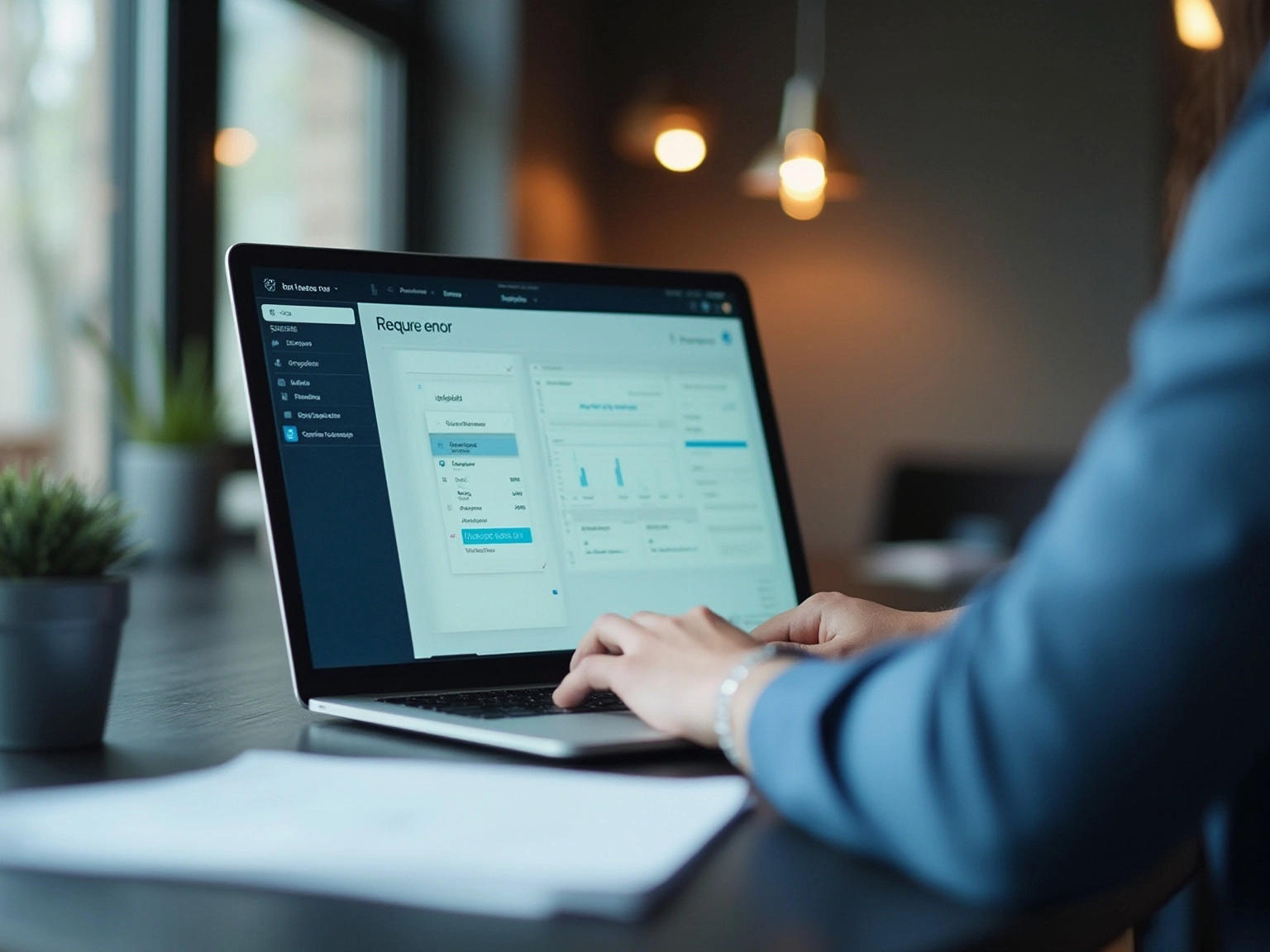Overview
This article tackles the crucial question of which accounting app aligns best with a user’s needs, underscoring the necessity of assessing specific business requirements, user experience, and integration capabilities. By elaborating on how various types of accounting apps serve distinct functions, it becomes evident that selecting the appropriate app can significantly boost operational efficiency, minimize response times, and enhance client engagement. This assertion is bolstered by case studies that illustrate considerable time savings and productivity improvements, inviting readers to envision their own success through informed choices.
Key Highlights:
- The rise of accounting apps is transforming financial management by streamlining processes and reducing errors.
- Demand for sophisticated accounting apps is projected to increase as firms embrace technology and digital transformation.
- 80% of accounting executives believe AI enhances productivity and offers a competitive edge.
- Companies with robust financial management practices are 70% more likely to make confident decisions.
- Automated communication tools, like Glasscubes, help reduce response times by 50% and enhance client engagement.
- Different types of accounting apps serve specific functions, such as invoicing and comprehensive financial management.
- User experience is crucial; intuitive apps lead to higher adoption rates and better productivity.
- Integration capabilities with existing tools are essential for operational efficiency in accounting apps.
- Future trends include increased automation through AI and cloud-based solutions providing flexibility and real-time collaboration.
- Selecting the right accounting apps requires assessing business needs, security features, and user experience.
Introduction
In recent years, the accounting landscape has undergone a seismic shift, propelled by the emergence of innovative accounting apps that are redefining financial management practices. These applications serve not merely as tools; they are revolutionizing the way accountants engage with clients, streamline processes, and enhance accuracy in financial reporting.
As firms move away from traditional methods such as manual bookkeeping and cumbersome email communications, they are uncovering significant time savings and reductions in errors that automation provides.
Looking ahead to 2025, the increasing demand for sophisticated accounting apps underscores their essential role in modern accounting. Many firms are eager to leverage the power of technology to maintain competitiveness and meet the evolving needs of their clients.
The Rise of Accounting Apps: Transforming Financial Management
The financial sector is undergoing a transformative shift, primarily driven by the rise of financial applications. These innovative accounting tools have become indispensable for accountants, enabling streamlined processes, enhanced client engagement, and improved financial management. By transitioning from traditional methods like manual bookkeeping and email communication to automated solutions, businesses are not only saving time but also significantly reducing errors.
As we approach 2025, the demand for sophisticated accounting apps is projected to increase, underscoring their essential role in modern financial practices. A recent report surveying over 100 leading accountancy firms reveals strong optimism for growth, especially among larger companies that are embracing technology and digital transformation. Supporting this shift, 80% of accounting executives believe that artificial intelligence (AI) offers a competitive edge, with 79% asserting it can enhance productivity, thereby illustrating the profound impact of accounting apps on financial management.
Companies that implement robust financial management practices are 70% more likely to make confident and effective decisions. Furthermore, organisations utilising platforms similar to those discussed have reported a 50% reduction in response times, showcasing the efficiency gains achievable through technology. Glasscubes enhances customer engagement by automating communication and information collection, ensuring that important replies do not get lost in busy inboxes.
Automated reminders actively pursue clients for outstanding information, saving valuable time and alleviating the stress associated with late submissions. As Sophie Montgomery from TaxAssist Accountants noted, businesses can save an impressive 288 hours in just one tax season, demonstrating the tangible benefits these tools provide.
Expert insights emphasise that the integration of accounting apps is not merely a trend but a necessity for companies striving to remain competitive. The focus on environmental, social, and governance (ESG) goals, coupled with the need for data-driven decision-making, further underscores the importance of leveraging technology in accounting.
Case studies illustrate successful transformations within accounting firms that have adopted these tools, resulting in enhanced operational efficiency and customer satisfaction. With the platform, all correspondence is organised within each audit request, offering a well-structured overview of pending items and inquiries. Additionally, Glasscubes is secure, encrypted, and GDPR compliant, providing peace of mind for both companies and their clients.
As the landscape continues to evolve, the benefits of utilising financial applications for accountants are clear: they not only streamline workflows but also foster a more organised approach to client information collection and interaction.

Exploring Different Types of Accounting Apps: Features and Functions
Financial applications, including accounting apps, can be categorised into several key groups, each designed to address specific functions within the financial landscape. Invoicing applications, such as QuickBooks and FreshBooks, primarily focus on billing and payment tracking, making them essential for businesses that prioritise cash flow management. Conversely, comprehensive accounting apps like Xero and Sage encompass a broader range of features, including payroll processing, tax compliance, and detailed financial reporting, which are crucial for maintaining regulatory standards and providing in-depth financial insights.
Moreover, practice management tools, represented by similar platforms, play a crucial role in enhancing customer engagement. By centralising communication and automating information requests, Glasscubes significantly reduces the time accountants spend on interactions with customers. Traditional email communication often results in challenges such as long email trails, misplaced responses, and duplicated requests, complicating the efficient collation of information.
This is particularly significant in a landscape where 53% of financial organisations have embraced cloud-based solutions for project management and client communication, as underscored by recent industry trends. Kathryn Yanchycki, a Chartered Professional Accountant, emphasises the importance of productivity in accounting: “I love all things business and productivity and have been able to merge my passion for creating content into writing for accounting companies seeking to enhance their operations.”
Understanding these categories is essential for companies aiming to enhance their workflows and meet specific operational requirements. For instance, organisations utilising this platform have reported exceptional results, including a 40% increase in customer response rates and a 50% reduction in response times. The platform’s automated reminders and real-time reporting ensure that responses are not misplaced, and all correspondence is organised, fostering confidence and efficiency.
Significantly, one accountant saved an impressive 288 hours in just one tax season by employing specialised software, showcasing the effectiveness of integrating tailored tools into financial practices. Furthermore, Glasscubes is secure, encrypted, and GDPR compliant, providing peace of mind for both companies and users. As the finance profession continues to evolve with technology, choosing the appropriate applications will be essential for sustaining competitiveness and enhancing overall efficiency.
Additionally, practices have gained an average of 31 new customers, with larger practices noting an average increase of 131 customers, underscoring the advantages of utilising financial applications.

Identifying Your Needs: Choosing the Right Accounting App for Your Firm
Choosing the right accounting apps necessitates a comprehensive evaluation of your business’s unique requirements. Key considerations include:
- The size of your business
- The complexity of your accounting tasks
- The degree of customer interaction needed when utilising accounting software
For instance, smaller enterprises often thrive with intuitive invoicing solutions that simplify processes, whereas larger organisations may demand robust systems capable of seamless integration with their existing frameworks.
Moreover, features such as automated reminders—exemplified by Glasscubes, which offers unlimited reminders on customisable schedules—can significantly enhance operational efficiency and improve client communication. As noted by Supawadee Moss, the accuracy of data management, calculations, and reporting stands as the paramount factor that financial and auditing firms prioritise when selecting software. This underscores the necessity for precision in your selection process.
It is equally vital to bolster security measures and increase awareness of CAIS security issues, as these elements have become increasingly pertinent in today’s digital environment. A thorough assessment of business needs is essential, encompassing an analysis of financial operations and considering scalability to ensure that the accounting applications align with your company’s objectives.
The case study of Inem Katering exemplifies the tangible benefits of choosing appropriate financial software; by adopting structured financial management, the business can markedly improve its financial reporting and growth potential.
By meticulously defining your company’s requirements, you can make an informed decision that not only fosters growth but also enhances customer satisfaction.

Comparative Analysis of Top Accounting Apps: Pros and Cons
Evaluating leading accounting apps is essential for understanding their respective advantages and disadvantages. QuickBooks stands out for its comprehensive features and extensive integrations, making it a versatile choice for diverse business needs. However, its complexity can present challenges for new users, potentially resulting in a steep learning curve.
Conversely, FreshBooks is renowned for its user-friendly interface, particularly beneficial for freelancers and small businesses. While it excels in ease of use, it may lack some advanced functionalities that larger platforms offer.
The company distinguishes itself by prioritising customer interaction and streamlining the information-collection process, significantly reducing response times. As Steve, an audit manager at MGI, notes, ‘Glasscubes has revolutionised the audit process by offering a centralised workspace where users can effortlessly upload information and monitor outstanding requests.’ This focus on enhancing communication efficiency is particularly advantageous for accounting practices facing slow responses from customers.
Each accounting app presents unique strengths tailored to different user requirements, underscoring the importance of aligning your choice of accounting apps with your firm’s specific operational needs.
In 2025, user satisfaction ratings reflect these distinctions: QuickBooks users value its robust capabilities, while FreshBooks users often praise its simplicity. Glasscubes, with its innovative approach, has received positive feedback for streamlining client interactions and enhancing transparency. Notably, the IRS Direct File initiative facilitates free federal return submission in 24 states, illustrating the evolving landscape of financial software and tax filing.
Ajit Singh, co-founder of a prominent financial analytics company, observes that “the system automatically identifies anomalies and trends in data, allowing financial analysts to react to changes promptly,” highlighting the significance of advanced functionalities in financial software. Additionally, the case study of SolveXia illustrates how cloud-based automation can drastically reduce manual task time and improve efficiency in financial data management.
As companies continue to navigate the dynamic landscape of financial software, understanding these nuances is crucial for selecting the right accounting apps for effective bookkeeping and business management. The selection of the best financial software should depend on business needs and growth potential, ensuring that the chosen tool aligns with operational requirements.
User Experience and Client Engagement: Key Considerations in App Selection
User experience is paramount in determining the effectiveness of accounting apps. A carefully crafted interface significantly reduces the learning curve for both accountants and their clients. Glasscubes exemplifies this by prioritising user engagement through a streamlined customer portal that simplifies information requests and enhances communication.
Its features, including automated reminders tailored for urgency and frequency, alongside real-time updates, encourage a proactive approach to customer interactions. This ensures that accountants can handle their workloads effectively.
In 2025, the importance of user experience in accounting apps cannot be overstated. With 78% of finance professionals anticipating that all future accounting methods will be automated, the demand for intuitive and user-friendly accounting apps is more critical than ever. Companies should concentrate on solutions that not only meet their functional needs but also enhance the overall user experience for both employees and customers.
For example, users of Glasscubes have reported significant enhancements in customer engagement, with companies experiencing a 40% rise in response rates and a 50% decrease in response times. The automated reminder function, which enables unlimited notifications customised to specific requirements, has proven especially effective in securing prompt replies from customers. The basic option allows for up to 10 reminders on a simple schedule, while advanced options enable unlimited reminders with any frequency or on specific days of the year.
Additionally, the customisation of push notifications can enhance reaction rates by up to 400%, further underscoring the significance of user engagement features in financial applications. This illustrates how impactful application design can lead to improved customer satisfaction and operational efficiency.
As the finance sector continues to evolve, prioritising user experience in accounting apps will be crucial for businesses aiming to maintain a competitive advantage. By adopting tools like Glasscubes, designed with user engagement in mind, financial organisations can significantly enhance their interactions and streamline their processes. Notably, companies catering to small businesses—70% of which lack an accountant—can greatly benefit from such tools to enhance client engagement and address common issues like missed communications and delayed responses.
Moreover, Glasscubes is secure, encrypted, and GDPR compliant, offering peace of mind for both companies and users. The real-time visual progress report feature allows accountants to see outstanding requests or queries clearly, ensuring that no information is misplaced or overlooked in busy inboxes.

Integration Capabilities: Ensuring Seamless Operations with Accounting Apps
When selecting accounting apps, the integration capabilities stand as a crucial factor, as numerous firms rely on a diverse array of tools to optimise their operations. The ability of a financial application to connect with these tools can yield significant efficiency improvements. For example, well-known applications such as Xero and QuickBooks offer extensive integration options with CRM systems, payment processors, and other vital business applications.
Glasscubes sets itself apart by delivering seamless integration with existing financial software, enabling smooth data transfer and enhanced communication. This capability not only fosters a more efficient workflow but also mitigates the risk of data silos, ensuring that information flows freely across platforms.
Looking ahead to 2025, a considerable proportion of businesses is expected to adopt accounting apps as integrated solutions, reflecting a growing recognition of the importance of these capabilities. Statistics indicate that companies utilising integrated systems experience superior operational efficiency, with many reporting heightened customer engagement and satisfaction. For instance, users like Sophie Montgomery from TaxAssist Accountants have reported saving an impressive 288 hours in a single tax season, underscoring the tangible benefits of leveraging the platform.
Additionally, organisations employing this platform have observed a 40% increase in customer response rates and a 50% reduction in response times, illustrating substantial improvements in efficiency and customer satisfaction through automated reminders and structured communication.
Real-world examples reveal how organisations capitalising on app integrations have transformed their processes, leading to significant time savings and enhanced productivity. As the financial software market continues to evolve and is projected to reach a value of $11.8 billion in the next eight years, emphasising integration capabilities in accounting apps will be essential for companies aiming to refine their operations and maintain a competitive edge. Furthermore, the service offers a secure, encrypted, and GDPR-compliant platform, providing peace of mind for both companies and their clients.
Just as Typeform users with a Zapier integration are 40% less likely to churn, the benefits of streamlined operations in financial applications cannot be overstated, particularly with the user-friendly platform that enhances communication and simplifies information collection.

Future Trends in Accounting Apps: What to Expect in the Coming Years
As we approach 2025, transformative trends are set to reshape the landscape of accounting apps, with the integration of artificial intelligence (AI) leading the charge. This advancement significantly enhances automation capabilities, allowing for sophisticated data analysis and reporting that streamlines processes traditionally reliant on extensive manual input.
Accounting apps that automate accounts payable processes can reduce paperwork by 90-95% and boost efficiency by 20-27%, underscoring AI’s potential in driving operational improvements.
Moreover, the ongoing rise of cloud-based accounting apps is expected to provide accountants with exceptional flexibility and accessibility. This platform enables real-time collaboration and data sharing, essential features for modern accounting apps. Automated reminders and real-time progress tracking ensure streamlined communication and efficient handling of information requests.
As companies increasingly emphasise safeguarding sensitive financial data in a progressively digital environment, improved cybersecurity strategies will become paramount. Providers must offer secure, encrypted, and GDPR-compliant solutions.
Firms often encounter challenges such as confusion from multiple email threads and a lack of visibility in audit processes. Glasscubes addresses these issues by providing a structured tool that eliminates duplicated requests, ensuring all correspondence is contained within each audit request. This method conserves time and enhances stakeholder engagement by fostering transparency and accountability.
Firms that proactively embrace these trends, particularly through accounting apps like Glasscubes, will be better positioned to leverage technology for improved efficiency and client engagement. A culture of innovation is essential for financial teams to adapt to new trends and technologies, ensuring they remain competitive in a rapidly evolving industry. Case studies indicate that the finance profession is adapting to challenges posed by automation and blockchain technologies, which promise to enhance bookkeeping reliability and foster a more diverse workforce.
As we approach 2025, the ability to adapt to accounting apps and other innovations will be crucial for accountants aiming to maintain trust and efficiency in their transactions.
Furthermore, the significance of value-based pricing is becoming increasingly pertinent in financial management, ensuring customers perceive sufficient value for their payments, thus promoting loyalty and sustainable growth. Expert predictions suggest that the role of AI in financial software development will continue to evolve, focusing on automating intricate and repetitive tasks. As Thilo Huellmann, CTO of AI company Levity, notes, “Artificial intelligence and robotics are reducing operational costs and increasing performance by automating complex and repetitive tasks and procedures with extreme precision.”
This shift not only boosts productivity but also enables financial teams to concentrate on more valuable tasks, ultimately enhancing customer satisfaction and loyalty.
In summary, the future of accounting apps is promising, with AI and automation leading the way toward more efficient and effective bookkeeping solutions. Companies that utilise these technologies, especially through platforms such as Glasscubes, will optimise their operations and improve their service offerings, ensuring they meet the evolving demands of their customers.

Making the Right Choice: Final Thoughts on Selecting Accounting Apps
Selecting the right accounting applications is a pivotal decision that can significantly enhance your company’s operational efficiency and customer engagement. It is vital to assess your company’s distinct needs in conjunction with the features and functionalities of available options. User experience is a critical factor in this selection process; applications that are user-friendly and intuitive can lead to higher adoption rates among both staff and clients.
Evidence indicates that organisations prioritising user experience in their app selection process experience a notable increase in productivity. For instance, companies that have implemented streamlined communication tools, like similar platforms, report a 50% reduction in response times, underscoring the tangible benefits of effective app integration. Glasscubes’ automated reminder feature empowers firms to send up to 10 reminders on a simple schedule, or an unlimited number of reminders with any frequency or on specific days of the year.
This feature can be tailored to include personalised messages for each reminder, ensuring that customers remain consistently engaged and informed about crucial deadlines.
When conducting a comparative analysis of financial software, key considerations should encompass:
- Integration capabilities
- Security features
- Availability of dedicated onboarding assistance
A recent case study emphasised the necessity of robust security measures in accounting systems, revealing that numerous organisations suffered financial losses due to security breaches. This underscores the importance of selecting applications that not only enhance functionality but also protect sensitive financial information.
Moreover, addressing user concerns during the transition to Glasscubes is imperative. Many companies initially expressed apprehension regarding client interaction with the new platform, yet feedback has shown that clients have embraced the change, resulting in smoother information management and improved collaboration. Clients have found it straightforward to upload and download information, alleviating initial worries about the transition process.
To make informed decisions in 2025, companies must stay abreast of emerging trends in accounting technology, including the adoption of accounting apps that leverage big data for accurate forecasting and performance assessments. Expert insights suggest that a comprehensive comparative analysis is essential; it enables firms to evaluate how various applications can meet their specific operational needs and enhance overall efficiency.
Practical examples further illustrate the impact of appropriate applications on business success. For instance, companies utilising Glasscubes have reported substantial time savings, with users like Sophie Montgomery from TaxAssist Accountants noting an impressive 288 hours saved in just one tax season. This highlights the potential for accounting apps to revolutionise workflows and elevate client satisfaction. In conclusion, a strategic approach to selecting accounting applications—rooted in thorough analysis and an understanding of user experience—can empower firms to drive business success and refine financial management in an increasingly competitive landscape.
Conclusion
The accounting industry is undergoing a transformative shift, propelled by the emergence of innovative accounting apps that are redefining firm operations. These applications not only streamline processes and enhance client engagement but also significantly reduce the time spent on manual tasks and minimise errors. As firms increasingly adopt these technologies, the benefits become increasingly evident, with many organisations reporting impressive time savings and productivity gains.
Looking ahead to 2025, the demand for sophisticated accounting apps is poised to surge, underscoring their essential role in modern financial management practices. Firms are recognising that embracing technology is not merely about keeping pace with competitors; it’s about leveraging automation and data-driven insights to enhance decision-making and operational efficiency. The integration of features such as automated reminders and secure communication channels, as exemplified by platforms like Glasscubes, highlights the critical importance of user experience in driving client satisfaction and engagement.
Ultimately, selecting the right accounting app is a strategic decision that can significantly impact a firm’s success. By thoroughly evaluating unique needs, considering user experience, and prioritising integration capabilities, firms can position themselves for growth in an increasingly digital landscape. As the accounting profession continues to evolve, those who proactively embrace these advancements will not only improve their operational efficiency but also foster stronger client relationships, ensuring they remain competitive and relevant in the years to come.
